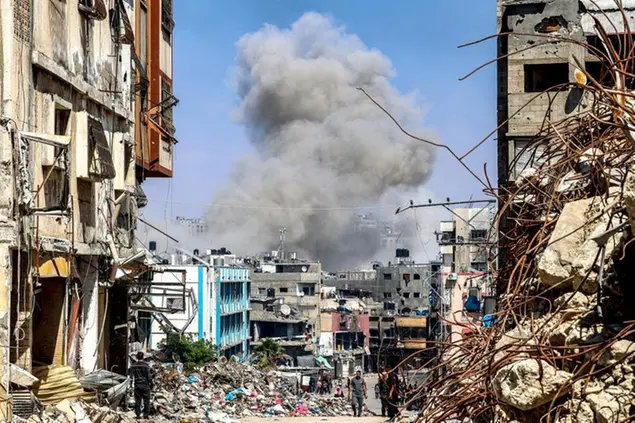PHOTO
Hamas chief Yahya Sinwar said Monday the Palestinian group had the resources to sustain its fight against Israel, with support from Iran-backed regional allies, nearly a year into the Gaza war.
Sinwar, who last month replaced slain Hamas leader Ismail Haniyeh, said in a letter to the group's Yemeni allies: "We have prepared ourselves to fight a long war of attrition".
Deadly fighting raged on in the besieged Gaza Strip, where medics and rescuers said Monday that Israeli strikes -- which the military has not commented on -- killed at least two dozen people.
The latest strikes came as Israeli Defence Minister Yoav Gallant warned that prospects for a halt in fighting with Hezbollah militants in Lebanon were dimming, yet again raising fears of a wider regional conflagration.
Gallant last week said Hamas, whose October 7 attack triggered the war, "no longer exists" as a military formation in Gaza.
Sinwar, in his letter to Yemen's Huthis, threatened that Iran-aligned groups in Gaza and elsewhere in the region would "break the enemy's political will" after more than 11 months of war.
"Our combined efforts with you" and with groups in Lebanon and Iraq "will break this enemy and inflict defeat on it", Sinwar said.
After months of mediation efforts towards an elusive Gaza truce deal, the United States is working "expeditiously" on a new proposal to bridge the remaining gaps between Israel and Hamas, said State Department spokesman Matthew Miller.
Miller said US Secretary of State Antony Blinken will discuss the ceasefire drive with Egyptian officials on a visit there this week.
He said that Israel's demand to keep troops on the Gaza-Egypt border and details on the release of captives remained the main sticking points.
Blinken will "discuss ongoing efforts to reach a ceasefire in Gaza that secures the release of all hostages, alleviates the suffering of the Palestinian people, and helps establish broader regional security," Miller said in a statement.
- Deadly strikes -
The October 7 attack on southern Israel that sparked the war resulted in the deaths of 1,205 people, mostly civilians, according to an AFP tally based on official Israeli figures.
Militants also seized 251 hostages, 97 of whom are still held in Gaza, including 33 the Israeli military says are dead.
Israel's retaliatory military offensive has killed at least 41,226 people in Gaza, according to the Hamas-run territory's health ministry, which does not provide a breakdown of civilian and militant deaths.
UN Secretary-General Antonio Guterres told AFP Monday that "nothing justifies" the collective punishment of the Palestinian people.
"We all condemn the terror attacks made by Hamas, as well as the taking of the hostages, that is an absolute violation of international humanitarian law," he said.
"But the truth is that nothing justifies the collective punishment of the Palestinian people, and that is what we are witnessing in a dramatic way in Gaza."
In central Gaza on Monday, survivors scoured debris after a strike on the Nuseirat refugee camp.
Ten people were killed and 15 were wounded when an air strike hit the Al-Qassas family home in Nuseirat, said a medic at Al-Awda Hospital, where the bodies were taken.
"My house was hit while we were sleeping without any prior warning," said survivor Rashed al-Qassas.
Gaza's civil defence said six Palestinians were killed in a strike in Gaza City, and emergency services later reported six more deaths in central and northern areas.
The Gaza war has drawn in Iran-backed Hamas allies across the Middle East, including Hezbollah in Lebanon and the Huthis, whose maritime attacks have disrupted global shipping through vital waterways off Yemen.
On Sunday the rebels claimed a rare missile attack on central Israel which caused no casualties, prompting Prime Minister Benjamin Netanyahu to warn that they would pay "a heavy price for any attempt to harm us".
In a televised speech, rebel leader Abdul Malik al-Huthi said: "Our operations will continue as long as the aggression and siege on Gaza continue."
- 'Fundamental change' -
Tensions have surged along Israel's northern border with Lebanon, amid fears that regular exchanges of fire between Israeli forces and Hamas ally Hezbollah throughout the war could explode into an all-out war.
On Monday Hezbollah claimed "dozens" of attacks on Israeli positions, and Israel's military said it struck "terrorist" targets in Lebanon.
"The possibility for an agreement is running out as Hezbollah continues to tie itself to Hamas," Gallant told visiting US envoy Amos Hochstein, a defence ministry statement said.
Netanyahu later told Hochstein he seeks a "fundamental change" in the security situation on Israel's northern border.
The US State Department's Miller told reporters: "We have long made clear that we believe a diplomatic solution is the correct way, the only way, to bring calm to the north of Israel and allow Israeli citizens to return to their homes."
He said Israeli officials "have always made clear ... that they would ultimately prefer a diplomatic resolution".
Hezbollah deputy chief Naim Qassem said Saturday his group has "no intention of going to war", but if Israel does "unleash" one "there will be large losses on both sides".
